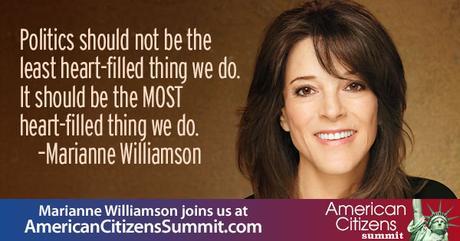The American Citizens Summit started last night, with a universal prayer by a Native American, Mona Polacca. I wasn't able to listen last night, so I caught up this morning before today's sessions start. As I said in my Compassionate Sunday post, The American Citizens Summit is a free, online convention for Americans looking for something above and beyond the party conventions, a convening of American citizens.

One of the speakers last night was author Marianne Williamson. As one might expect, her talk was filled with heart and light.
Here are quotes from a couple of other speakers that clicked for me:
The value systems in Left and Right are very complementary in a deep way. Both are essential for evolving our American democracy. They are like the two wings of the American eagle and we need both to fly. ~ Stephen Dinan
The key ingredient is learning....We're starting out with a very different attititude, very much more like Jefferson had. Let's learn every generation how to reinvent and recreate this country. ~ Mark Gerzon
Another speaker, one that I didn't expect to relate to as much, led me to some new thoughts. Grover Norquist is the president of Americans for Tax Reform and he spoke from his experiences of searching out and finding issues that can be worked on together by the Left and Right by principled people, even if they are working from different principles. The two can push from either side on what he calls the "mushy middle" to make real change on some (but not all) issues.
Here's where that led me. I've recently had the thought that activists on the Left can be successful because we care more and work harder. If that were true, it's a reasonable strategy. But, I suspect that it's not true - it just seems like it because I spend all my time in my circles. After all, if caring and work by the Left were all it takes to make change, we'd have gun control by now. If it's not true that the Left works harder than the Right, then it makes more sense to explore Left-Right coalitions. Look for the common places where we find ourselves, even if we got there for different reasons.
In fact, now that I think about it, the areas where St. Louis is changing since the Ferguson Uprising are ones where political affiliations were ignored or not known. They came from American principles like fairness or from consideration of nonpartisan questions like "what's best for the children?"
In this election year when we seem so divided as a country, are there places where you see unexpected commonality?

About Joy Weese Moll
a librarian writing about books
